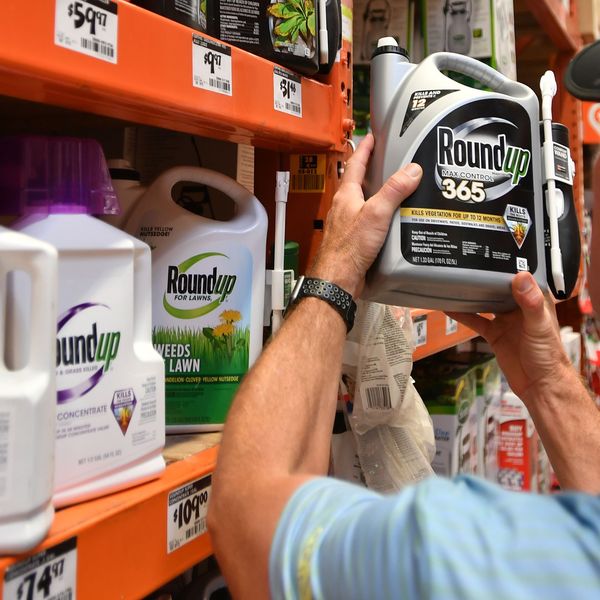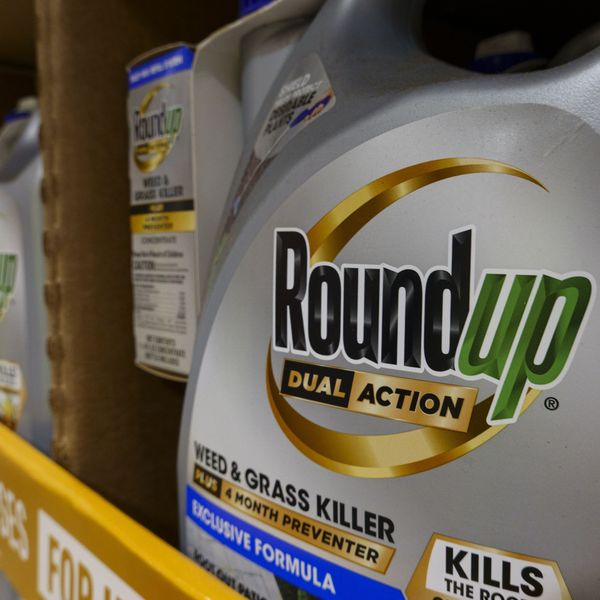Monsanto May Have Won the Battle for I-522, But the Future of Food Is Not Lost
As final results come in for Initiative 522, advocates of GMO labeling are saying we need to change the system, not just the supermarket.

"It's an uphill battle, but the race is not over," said Elizabeth Larter, Yes on 522's media director. "We still have more than 300,000 ballots to count." Larter went on to point out that later voters typically comprise of younger, more liberal constituents, people more likely to support I-522.
Roughly 100,000 ballots were still left to count in King County, the state's most liberal and populous, and that left enough room for cautious optimism among labeling advocates. As of press time, 45 percent had voted yes, while 55 percent voted no.
Last year's labeling campaign in California, Prop 37, saw a wider margin on election night, but, according to the campaign's media director, Stacy Malkan, six points eventually shrunk to three as ballots were counted. That narrow margin has seemed to indicate growing support for labeling genetically engineered foods, despite more than $46 million being spent by the opposing side to defeat it.
On Initiative 522, Malkan said she's "watching the numbers with interest," but expressed frustration with the opposing side's "dirty tricks."
"They pick on the details of the initiative, and scare people about cost," she said.
A need for deeper reform
But 522's likely failure might point more directly at institutional barriers than at public opinion.
"We have a broken political system right now," said Mark Schlosberg of advocacy group Food and Water Watch. "To really change it, we need to change our democracy."
Both Malkan and Schlosberg addressed a deeper need for reform and transformation of the political process, referring to campaign finance reform and the Supreme Court's decision in the Citizens United case.
Earlier this month, Washington's Attorney General filed suit against the Grocery Manufacturers Association, a major donor to No on 522, alleging the lobbying group violated state campaign finance laws. The GMA registered and disclosed the required information thereafter, according to the Attorney General's website.
Yes on 522 might not succeed at passing a labeling law (final results are expected to be released at 4:30 p.m. PST). Although labeling advocates are disappointed, progress can be found elsewhere, if not in state congresses throughout the United States.
Malkan referred to a well-cited New York Times poll this year that found that more than 90 percent of Americans support labeling. She also mentioned that companies like Target, Trader Joe's, and other grocery chains recently signed a pledge stating that they will refuse to sell genetically engineered salmon in their stores once that product becomes commercially available.
And powerful food manufacturers like Kraft and Mars steered clear of participating in the race by refusing to donate money to either campaign, according to Malkan. They did not want to put their brands at risk.
Malkan believes that the coming years will ultimately bring labeling. "But in the meantime, we can reject those brands--like Nestle, Coca Cola, and Pepsi--that worked to fight this bill. And we'll keep organizing. I still believe it's unstoppable."
_____________________________________________________
This article was written for YES! Magazine, a national, nonprofit media organization that fuses powerful ideas with practical actions.
An Urgent Message From Our Co-Founder
Dear Common Dreams reader, The U.S. is on a fast track to authoritarianism like nothing I've ever seen. Meanwhile, corporate news outlets are utterly capitulating to Trump, twisting their coverage to avoid drawing his ire while lining up to stuff cash in his pockets. That's why I believe that Common Dreams is doing the best and most consequential reporting that we've ever done. Our small but mighty team is a progressive reporting powerhouse, covering the news every day that the corporate media never will. Our mission has always been simple: To inform. To inspire. And to ignite change for the common good. Now here's the key piece that I want all our readers to understand: None of this would be possible without your financial support. That's not just some fundraising cliche. It's the absolute and literal truth. We don't accept corporate advertising and never will. We don't have a paywall because we don't think people should be blocked from critical news based on their ability to pay. Everything we do is funded by the donations of readers like you. Will you donate now to help power the nonprofit, independent reporting of Common Dreams? Thank you for being a vital member of our community. Together, we can keep independent journalism alive when it’s needed most. - Craig Brown, Co-founder |

"It's an uphill battle, but the race is not over," said Elizabeth Larter, Yes on 522's media director. "We still have more than 300,000 ballots to count." Larter went on to point out that later voters typically comprise of younger, more liberal constituents, people more likely to support I-522.
Roughly 100,000 ballots were still left to count in King County, the state's most liberal and populous, and that left enough room for cautious optimism among labeling advocates. As of press time, 45 percent had voted yes, while 55 percent voted no.
Last year's labeling campaign in California, Prop 37, saw a wider margin on election night, but, according to the campaign's media director, Stacy Malkan, six points eventually shrunk to three as ballots were counted. That narrow margin has seemed to indicate growing support for labeling genetically engineered foods, despite more than $46 million being spent by the opposing side to defeat it.
On Initiative 522, Malkan said she's "watching the numbers with interest," but expressed frustration with the opposing side's "dirty tricks."
"They pick on the details of the initiative, and scare people about cost," she said.
A need for deeper reform
But 522's likely failure might point more directly at institutional barriers than at public opinion.
"We have a broken political system right now," said Mark Schlosberg of advocacy group Food and Water Watch. "To really change it, we need to change our democracy."
Both Malkan and Schlosberg addressed a deeper need for reform and transformation of the political process, referring to campaign finance reform and the Supreme Court's decision in the Citizens United case.
Earlier this month, Washington's Attorney General filed suit against the Grocery Manufacturers Association, a major donor to No on 522, alleging the lobbying group violated state campaign finance laws. The GMA registered and disclosed the required information thereafter, according to the Attorney General's website.
Yes on 522 might not succeed at passing a labeling law (final results are expected to be released at 4:30 p.m. PST). Although labeling advocates are disappointed, progress can be found elsewhere, if not in state congresses throughout the United States.
Malkan referred to a well-cited New York Times poll this year that found that more than 90 percent of Americans support labeling. She also mentioned that companies like Target, Trader Joe's, and other grocery chains recently signed a pledge stating that they will refuse to sell genetically engineered salmon in their stores once that product becomes commercially available.
And powerful food manufacturers like Kraft and Mars steered clear of participating in the race by refusing to donate money to either campaign, according to Malkan. They did not want to put their brands at risk.
Malkan believes that the coming years will ultimately bring labeling. "But in the meantime, we can reject those brands--like Nestle, Coca Cola, and Pepsi--that worked to fight this bill. And we'll keep organizing. I still believe it's unstoppable."
_____________________________________________________
This article was written for YES! Magazine, a national, nonprofit media organization that fuses powerful ideas with practical actions.

"It's an uphill battle, but the race is not over," said Elizabeth Larter, Yes on 522's media director. "We still have more than 300,000 ballots to count." Larter went on to point out that later voters typically comprise of younger, more liberal constituents, people more likely to support I-522.
Roughly 100,000 ballots were still left to count in King County, the state's most liberal and populous, and that left enough room for cautious optimism among labeling advocates. As of press time, 45 percent had voted yes, while 55 percent voted no.
Last year's labeling campaign in California, Prop 37, saw a wider margin on election night, but, according to the campaign's media director, Stacy Malkan, six points eventually shrunk to three as ballots were counted. That narrow margin has seemed to indicate growing support for labeling genetically engineered foods, despite more than $46 million being spent by the opposing side to defeat it.
On Initiative 522, Malkan said she's "watching the numbers with interest," but expressed frustration with the opposing side's "dirty tricks."
"They pick on the details of the initiative, and scare people about cost," she said.
A need for deeper reform
But 522's likely failure might point more directly at institutional barriers than at public opinion.
"We have a broken political system right now," said Mark Schlosberg of advocacy group Food and Water Watch. "To really change it, we need to change our democracy."
Both Malkan and Schlosberg addressed a deeper need for reform and transformation of the political process, referring to campaign finance reform and the Supreme Court's decision in the Citizens United case.
Earlier this month, Washington's Attorney General filed suit against the Grocery Manufacturers Association, a major donor to No on 522, alleging the lobbying group violated state campaign finance laws. The GMA registered and disclosed the required information thereafter, according to the Attorney General's website.
Yes on 522 might not succeed at passing a labeling law (final results are expected to be released at 4:30 p.m. PST). Although labeling advocates are disappointed, progress can be found elsewhere, if not in state congresses throughout the United States.
Malkan referred to a well-cited New York Times poll this year that found that more than 90 percent of Americans support labeling. She also mentioned that companies like Target, Trader Joe's, and other grocery chains recently signed a pledge stating that they will refuse to sell genetically engineered salmon in their stores once that product becomes commercially available.
And powerful food manufacturers like Kraft and Mars steered clear of participating in the race by refusing to donate money to either campaign, according to Malkan. They did not want to put their brands at risk.
Malkan believes that the coming years will ultimately bring labeling. "But in the meantime, we can reject those brands--like Nestle, Coca Cola, and Pepsi--that worked to fight this bill. And we'll keep organizing. I still believe it's unstoppable."
_____________________________________________________
This article was written for YES! Magazine, a national, nonprofit media organization that fuses powerful ideas with practical actions.

